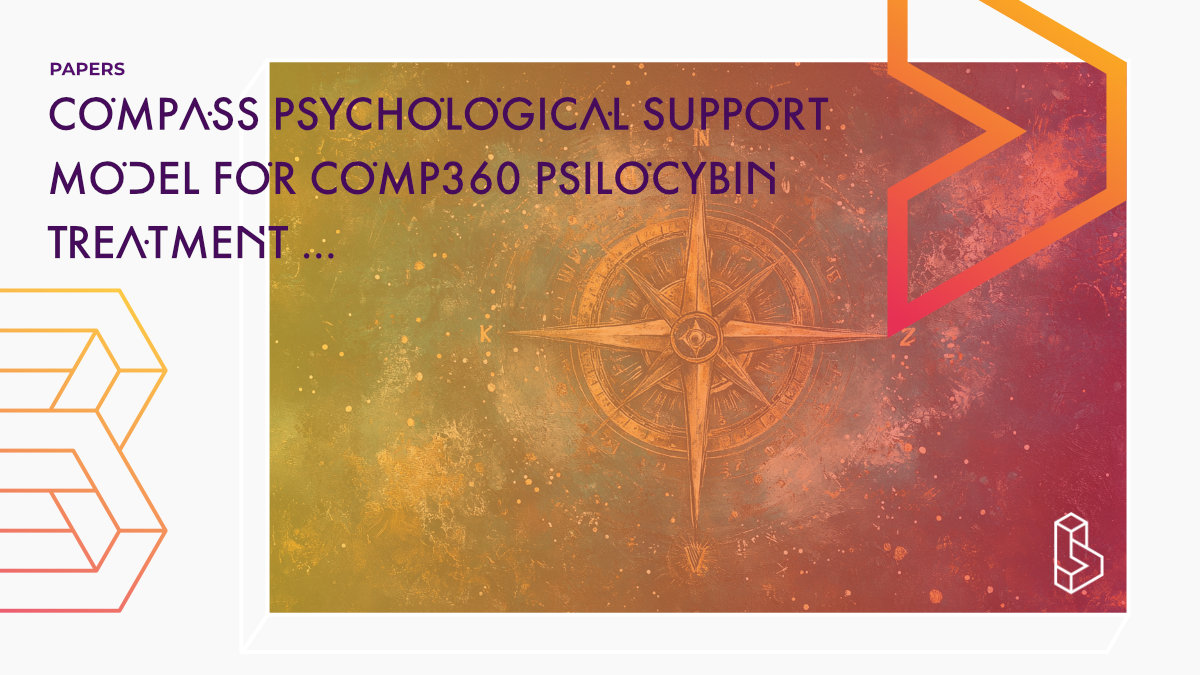This article describes the Compass Psychological Support Model (CPSM) used to support participants with treatment-resistant depression undergoing investigational psilocybin treatment. The CPSM aims to ensure a safe and meaningful psychedelic experience, complemented by therapist training, mentoring, and fidelity assessment to maintain delivery quality and consistency.
Abstract of Compass Psychological Support Model for COMP360 Psilocybin Treatment of Serious Mental Health Conditions
“The psychedelic experience can be challenging. There is a need for a structured framework for providing psychological support to individuals with mental health conditions receiving investigational psilocybin treatment. The primary benefit of such a framework is to support a safe and meaningful psilocybin experience. It also enables future research on the facets of psychological support and/or psychotherapy that most optimally complement psilocybin treatment. The authors describe the Compass Psychological Support Model (CPSM), currently used to support participants with treatment-resistant depression in Compass-sponsored clinical trials of investigational COMP360 psilocybin treatment. The authors also outline the therapist training, mentoring, and fidelity assessment programs they have developed to ensure the quality and consistency of the CPSM delivery.“
Authors: Namik Kirlić, Molly Lennard-Jones, Merve Atli, Ekaterina Malievskaia, Nadav L. Modlin, Stephanie Knatz Peck, Alice Gaillard, Guy M. Goodwin & Don Koelpin
Summary of Compass Psychological Support Model for COMP360 Psilocybin Treatment of Serious Mental Health Conditions
The Compass Psychological Support Model (CPSM) has been developed to support individuals receiving investigational psilocybin treatment for mental health conditions. Psilocybin, a serotonergic psychedelic, produces altered cognitive and sensory states, often accompanied by profound emotional and psychological phenomena. However, these experiences can also lead to feelings of unease, heightened arousal, or mood fragility post-treatment. Effective psychological support is critical to ensure a safe and meaningful treatment experience and mitigate risks, such as overwhelming distress or unrealistic expectations leading to hopelessness.
Historically, research on psychedelics has emphasised the importance of psychoeducation, preparation, and psychological support to ensure positive outcomes. While several frameworks have been created for psilocybin treatment, ambiguity remains about the optimal approach, especially as the field advances toward regulatory approval. CPSM seeks to address this gap by standardising psychological support delivery in clinical trials for psilocybin, ensuring data integrity and participant safety. It is tailored specifically for COMP360 psilocybin, Compass Pathways’ proprietary formulation, and is not intended as a standalone psychotherapy for mental health conditions.
The Compass Psychological Support Model
Structure and Delivery
Find this paper
https://doi.org/10.1176/appi.ajp.20230884
Open Access | Google Scholar | Backup | 🕊
Cite this paper (APA)
Kirlić, N., Lennard-Jones, M., Atli, M., Malievskaia, E., Modlin, N. L., Peck, S. K., ... & Koelpin, D. (2025). Compass psychological support model for COMP360 psilocybin treatment of serious mental health conditions. American Journal of Psychiatry, 182(1), 126-132.
Study details
Compounds studied
Psilocybin
Topics studied
Treatment-Resistant Depression
Depression
Study characteristics
Theory Building
Institutes
Institutes associated with this publication
COMPASS PathwaysCOMPASS Pathways is a publicly listed company (NASDAQ) that is developing psilocybin for treatment-resistant depression (TRD) for which it has completed a successful Phase IIb trial. COMPASS is one of the largest psychedelic companies and has received substantial investment from atai.
Linked Research Papers
Notable research papers that build on or are influenced by this paper
Single-Dose Psilocybin for a Treatment-Resistant Episode of Major DepressionThis double-blind active-placebo controlled trial (n=233) tested the effect of a single dose of psilocybin (25/10/1mg) with supportive therapy for treatment-resistant depression. The primary endpoint at three weeks finds a significant reduction in depressive symptoms (MADRS, 12-point drop from baseline of 32) that was significantly greater in the 25mg group vs the 1mg (placebo) group (6.6 points larger drop). The response (>50% drop in MADRS score) in the 25mg group dropped from 37% at 3 weeks to 20% at 12 weeks.
The effects of psilocybin on cognitive and emotional functions in healthy participants: Results from a phase 1, randomised, placebo-controlled trial involving simultaneous psilocybin administration and preparation
This Phase I RCT indicates that 10mg and 25mg doses of psilocybin are generally well-tolerated when administered to up to 6 participants simultaneously. Participants (n=89) each received one-to-one psychological support during the sessions. 511 treatment adverse events (TEAEs) were reported, 67% of which were resolved on the day of administration in the largest published trial with psilocybin to date.

